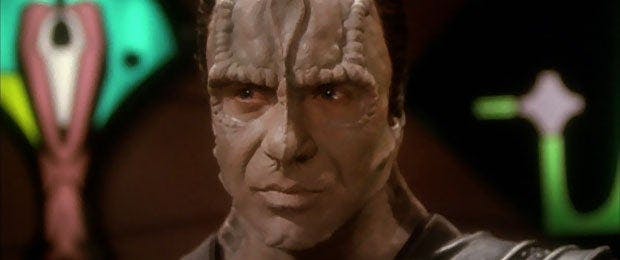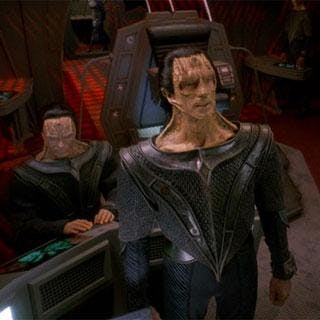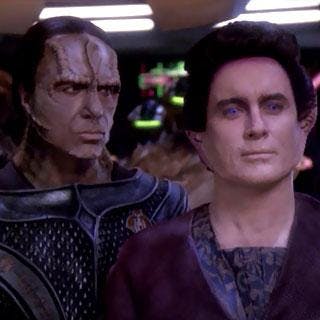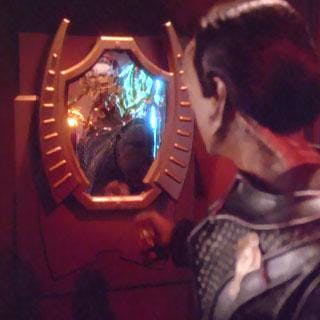Published Apr 5, 2012
Catching Up With Casey Biggs, Part 1
Catching Up With Casey Biggs, Part 1

Star Trek: Deep Space Nine was stacked with top-notch character actors who stepped into recurring roles and made them their own, in the process upping the ante for the show’s regulars and other guest stars, and adding additional layers of intrigue to DS9’s brand of dark, compelling storytelling. One such actor was Casey Biggs, who breathed vivid life into Damar, who rose from Cardassian officer under Gul Dukat to (puppet) leader of Cardassia, and then from hero to martyr. Biggs played Damar – and variations of the character, including a hologram and hallucination – in 23 episodes spanning from “Return to Grace” in season four to the series finale, “What You Leave Behind,” in season seven. The actor also portrayed the human Dr. Wykoff in the seventh-season DS9 hour “Shadows and Symbols” and an Illyrian captain in the Star Trek: Enterprise installment “Damage.” StarTrek.com recently caught up with Biggs for an in-depth two-part interview in which he recounted his Star Trek experiences and filled us in on what he’s doing these days. Below is part one of our exclusive conversation, and visit StarTrek.com again tomorrow to read part two.
Damar was supposed to be a one-off, right?
Biggs: Exactly. I even said, “Why are they asking me to come in here? They could get anyone to do this.” It was like one line, or something. Little did I know they were looking for a foil for Dukat, for Marc Alaimo’s character. When I got on there they just liked what I was doing so much that they just kept writing more and more and more. I was on the show for four years, I think, and the role kept getting bigger and bigger. It was a wonderful character arc to play, to go from the bad guy’s lackey to the leader of the empire. That was pretty great.

You ultimately played Damar in 23 episodes of DS9. What do you remember of “Return to Grace,” your very first outing?
Biggs: I’d never done anything like it before. I had no idea who these Cardassians were. My first day I met Marc Alaimo, and thank God. He’s the quintessential Cardassian. He is Cardassian. He said, “Arrrggh, don’t worry about it. I’ll tell you what you need to know.” It was actually quite a good episode. We were on this clunker ship and we hijacked or sabotaged a Klingon ship. I thought, “Oh, this is going to be a good storyline,” but then they dropped that right away, for some reason. But what a world to step into, boy, I’ll tell you. I’m still great friends with the majority of the people and have the highest regard for their abilities. Most of them were classically trained actors, which was terrific.

DS9 was thick with political intrigue. Did you read scripts or watch episodes that you weren’t in, in order to keep track of everything for when you/Damar were involved?
Biggs: I have to say no, I didn’t. I read the scripts that I was in. Then, I did start watching the show a little bit. Marc and I talked a lot. Jeff Combs became a good friend, and Damar and Weyoun became the Bickersons of outer space, as I called us. But, as an actor does, you do your homework. The first time I did looping, I went to the looping stage and they said, “You weren’t Cardassian enough.” I said, “What the hell does that mean?” They said, “We have no idea what that means.” I just decided that these guys are military, that they’re patriotic military guys, and that should be their focus. There’s a certain way, when you spend your entire life serving something or someone, that you behave. What I really loved about what they did with my character was they allowed him ultimately to get much more of a sense of humor, as bizarre as it was.
You’ve said that it was (writer-producer) Hans Beimler who created Damar…Biggs: He did. Every time my character appeared on screen, whether he wrote it or not, he got like 200 bucks. That’s what he said. Ultimately, Damar became a very, very complex character. In the beginning, it was very two-dimensional. He was just somebody sitting there to serve the cause. Then I started to get a conscience when I was used as a puppet to take over during the whole Founders storyline. Then, Damar couldn’t take it anymore, went underground, and became a rebel and ultimately a hero. I mean, what a fantastic character arc to play. What was wonderful, and what I think I brought to it, was that conflict, that inner conflict that you go through when you’re doing things you don’t really want to do or you don’t really believe in. Then, if you get the courage to really step up to the plate, it gets wonderful. So I was very honored to have played that.
We’re not going to ask you to go through every episode…
Biggs: I have to honestly say that I don’t remember them all, so that’s probably a good thing.

Let’s ask you this, though: which ones stick out the most in your mind all these years later, and why?
Biggs: I liked the one where I kept killing off Weyoun (Combs). I remember a wonderful scene where Weyoun comes into my office and starts griping at me, and I say, “You’d better be careful or I’ll be talking to Weyoun #9 pretty soon.” I loved that kind of stuff. I also loved the one ("Strange Bedfellows") that Rene Auberjonois directed, where I actually stopped drinking. I got to throw that horrible kanar at the mirror and watch it drip down, and I never had to take another sip of that stuff. That was also the episode where I found out that I had a family. I had no idea that Damar even had a family until I read that script. Weyoun comes in and says, “Well, your wife and child were killed.” I read that and said, “I had no idea that I had a wife and child.” I might have played Damar a little differently if I had known that.
Check in again tomorrow at StarTrek.com to read the second half of our interview with Casey Biggs.
